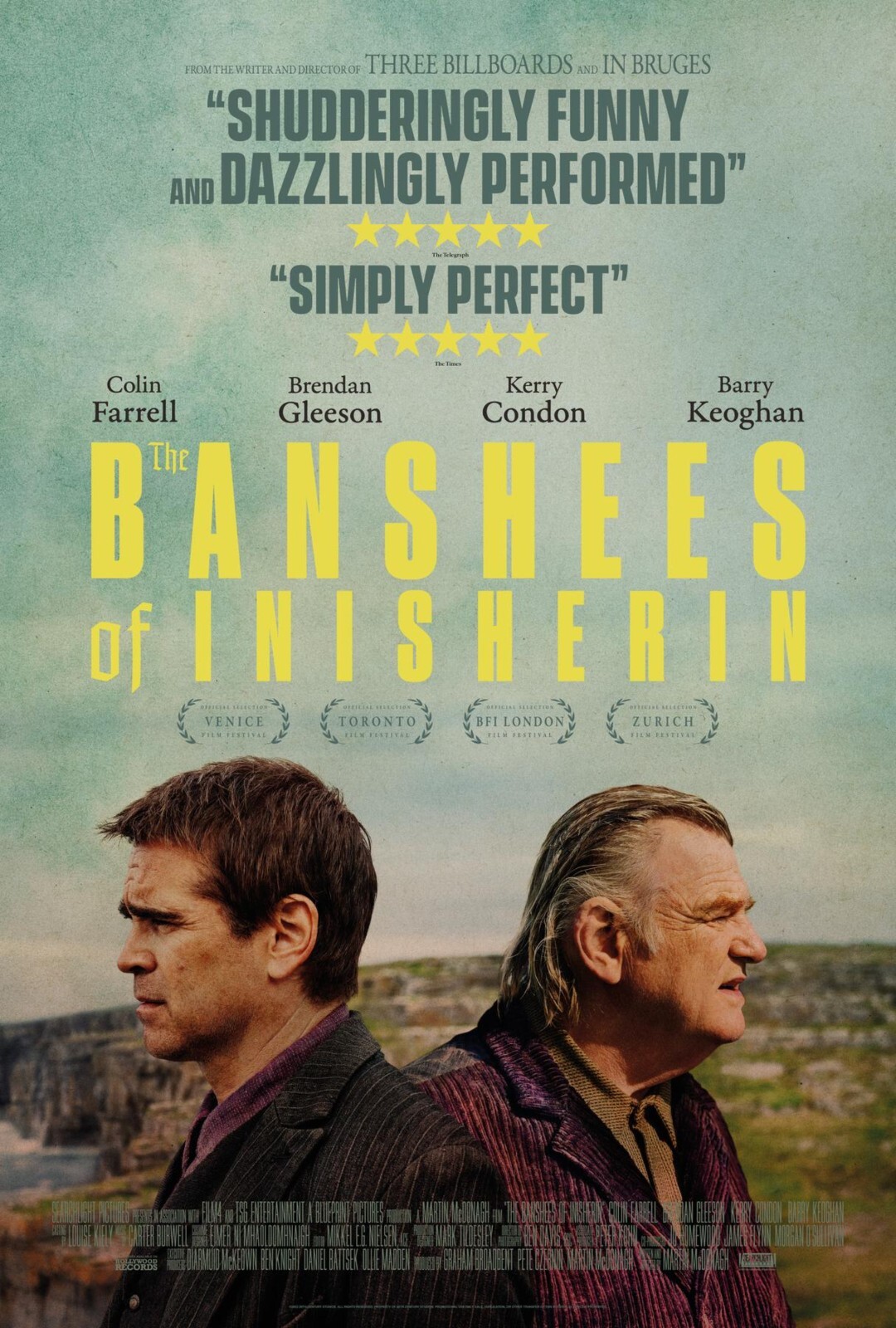August 2025 Watch Part 2
Sunday, 31 August 2025
If I have done the math correct, then Together will be my 100th review! It’s been an interesting year getting to know how exactly I want to format these responses and sharpening up my (admittedly still quite limited) html skills to be able to do that more successfully. I feel like I’ve learned a lot about myself, like that it’s been really good for me to stick with a project this long and experiment as I go.
In terms of reviews, it’s been about 20% television and 80% film. This doesn’t necessarily reflect my viewing habits, as there have been many rewatches, DNFs, and a small handful of things I just did not review. I’ve refined my thoughts about many things, including adaptations and anthologies (there is absolutely a reason there are no anthologies on here). I’ve also refined my writing process, and I find I can more confidently rely on my observational and analytical skills, whereas I more frequently doubted them earlier on. Even though I had a lot of the knowledge I have now, though certainly not all, I wasn’t as sure about stating my opinion so resolutely. Looking back on past responses, I don’t think this always comes across, but it does characterize where I was at back then.
Barring any severe changes in mind, I am looking to continue this process, although I’ve also been trying to branch out with the other pages on my website. The biggest hurdle going forward that I’m still navigating how to manage is the independence of this project. I started this while I was living with my family again and not really having anyone to talk to about this favorite hobby of mine. With that looming again in the very near future, I have to wonder how things will play out. In the future, I want to add a bit more context in my reviews, as I think it would allow me to be more precise—and ideally meaningful—in my commentary.
In the meantime, though, please enjoy this month’s responses. I’ve tried to improve my writing a bit since last month (where I felt I was quite clearly dissertation-tired) by varying the length of each based on how much I had to say. I always do this a little bit, but I think this is some of the biggest range I’ve had. It’s helped to balance this with my dissertation, though that is coming to a close anyway.
Death of a Unicorn (2025, dir. Alex Scharfman)
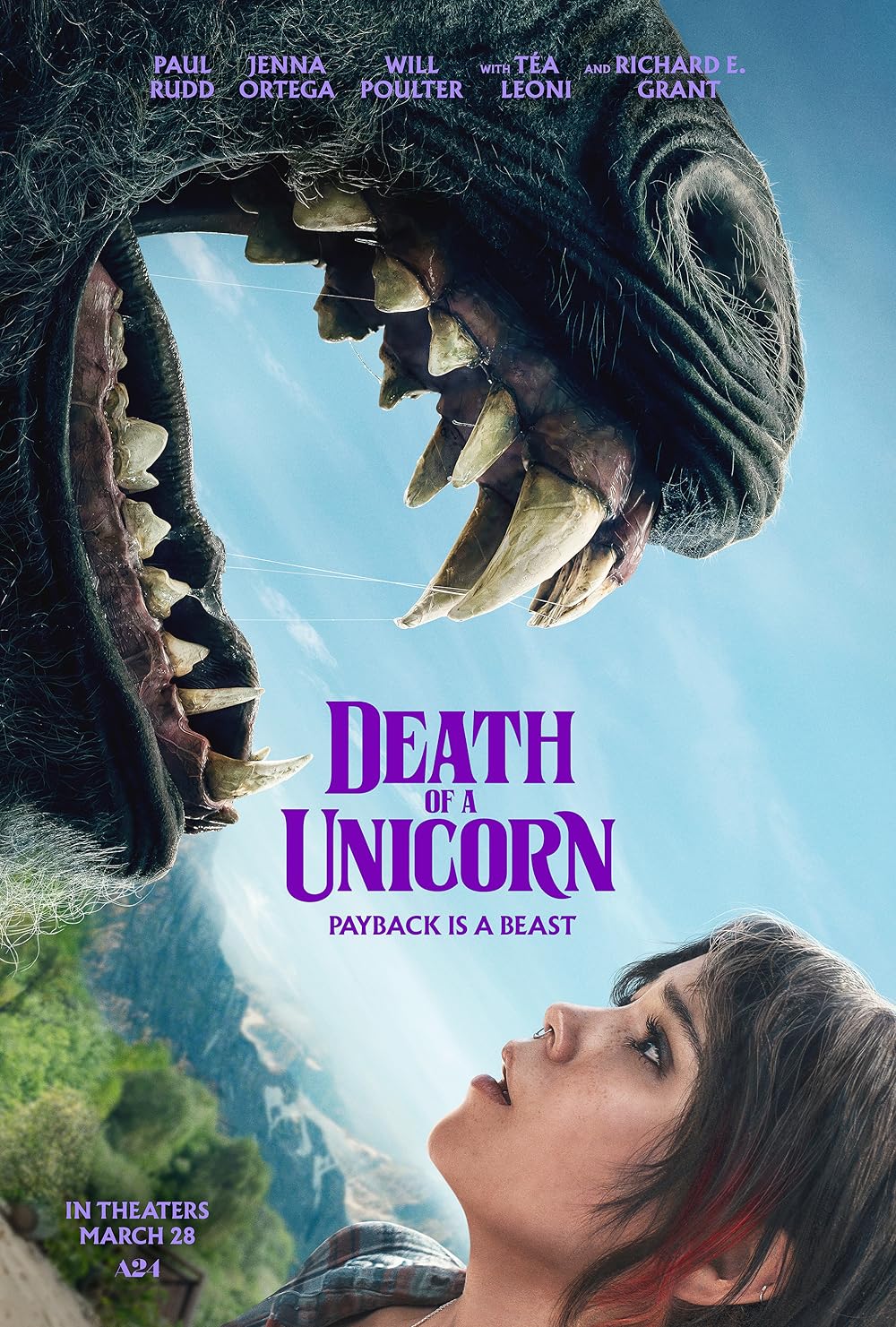
Death of a Unicorn is a dark comedy horror with an ecological and class-conscious message that follows father and daughter Elliot and Ridley as they visit Elliot’s boss’s home in hopes of securing their financial future. On the drive there, they hit a unicorn with their car and bring it to the mansion with them, a choice that ultimately leads to the household being attacked by several bloodthirsty unicorns as the characters attempt to profit from the death of this creature, whose body can heal all ailments.
I was put off by this movie due to the trailer, and it really is my fault that I watched it anyway; that said, I will admit that what I assumed would be my biggest gripe was not it at all. I was correct in predicting that the ecological allegory would be prominent without being artful, and indeed it lacked complexity that might have saved it from being predictably basic. It’s not at all that the concept is bad, but that it’s so simple and cleanly graphed onto the narrative. I would argue that the simplicity of concept demands one of four things: friction between the allegory and narrative that allows the topic to be explored in a new or unique capacity, precision of storytelling that reveals something special about the perspective of this project, stronger writing overall that lets the allegory become secondary to the story though still important, or excellent use of the audio-visual medium of film. All four of those were absent, which each exemplify my main gripes with this movie.
For starters, the lack of friction meant there was no complexity of emotion. I’m going to return to an issue I often think about that comes up especially often in horror, including in this film: the insistence upon portraying hyperwealthy characters as one of these basic, frivolous characters in a set of stock personas and then terming it “satire.” It’s not that I don’t understand the reasoning behind this choice, but I think the ubiquity and blandness make it lose a lot of the impact some of these concepts could have. These types of characters often come in otherwise quite blandly executed horror as they attempt to bring in satirical elements, when really it just indicates a lack of complexity to their allegedly class-conscious perspectives. And if I’m honest, I think this is an easy (and uninteresting) out on what has the potential to be an interesting story or commentary. Furthermore, if a film doesn’t spend time humanizing these characters, then the truth of the issues it wants to discuss cannot be accessed in the film itself. Bringing it back to this movie, I think fleshing out some of these characters is only one solution, but not one I’m sure would’ve been possible. We actually got to see it make an attempt at complexity in Elliot and the scientist characters in their monetary motivations. However, these were underdeveloped ideas that didn’t get the weight they deserved, thus making those moments fall flat on a background of one-note characters.
The simplicity of the characters brings me to my next point: the film’s lack of precision. It’s true the characters were incredibly generic—we spend almost no time getting to know them, and there is very little to any of them. The relationships between them did not for a moment feel legitimate; I consistently felt distance and lack of heart. Even for the more fleshed-out characters, their emotional beats felt bland and uninteresting, mainly because there was no specificity in who they were. This story felt like you could swap out any element of it for another and nothing would change, and that was most true in the father-daughter relationship. The complete lack of emotional impact of their story was something I absolutely saw coming from their first interaction, but was still a disappointment by the end of the movie.
I think that hints at a very real criticism I had of this film, which is that the genericism extends to the plot. The structure of this film felt so classically “killer creature is an animal,” although with none of the impact that usually allows. The story followed very clear beats and left no room for development of plot or character. At some points, I wondered if a guide had been made for horror pacing and was followed with absolutely no deviations from its list of scenes. I knew the whole movie before it happened, and not because it was so well-crafted, but because it was not character action driving the plot forward, but tropey pacing.
With all of these elements I’ve discussed so far, it’s not inherently an issue for them to be pulled from stock ideas and practices. However, if the entire movie is entirely composed of them, it starts to lose my attention. At that point, the only thing that could save it is the medium, specifically using it to its full potential. Which my tone and previous words have likely indicated it doesn’t. It is so generically shot. There is this one scene where Elliot and Ridley are talking across a room and as basic as it was, it felt like the only shot in the movie with any intended significance. The editing was also not my favorite as it felt as though it severely underestimated the audience. In the first fifteen minutes of the movie we flash back to something that happened less than five minutes before—in case you forgot and couldn’t tell what this character was thinking about. The effects probably go without saying, but the CGI unicorns and gore… I don’t want to talk about it anymore.
The thing is, I’m not trying to suggest the movie is bad. In fact, it was quite middling the entire runtime, although occasionally aggravating out of pure boredom. My issue comes as it has nothing interesting to say or do. It plays its themes too safely to say anything meaningful, it has no legitimate interest in exploring the characters, it doesn’t even seem particularly fond of creature movies, and it seems ambivalent about its visual qualities. I wish I had a way to conclude this, because writing this has felt like I’ve been building to something, but instead I’ll leave you with a shoutout to Anthony Carrigan, who was so funny in this film and who I was delighted to see in another I watched this month.
Together (2025, dir. Michael Shanks)
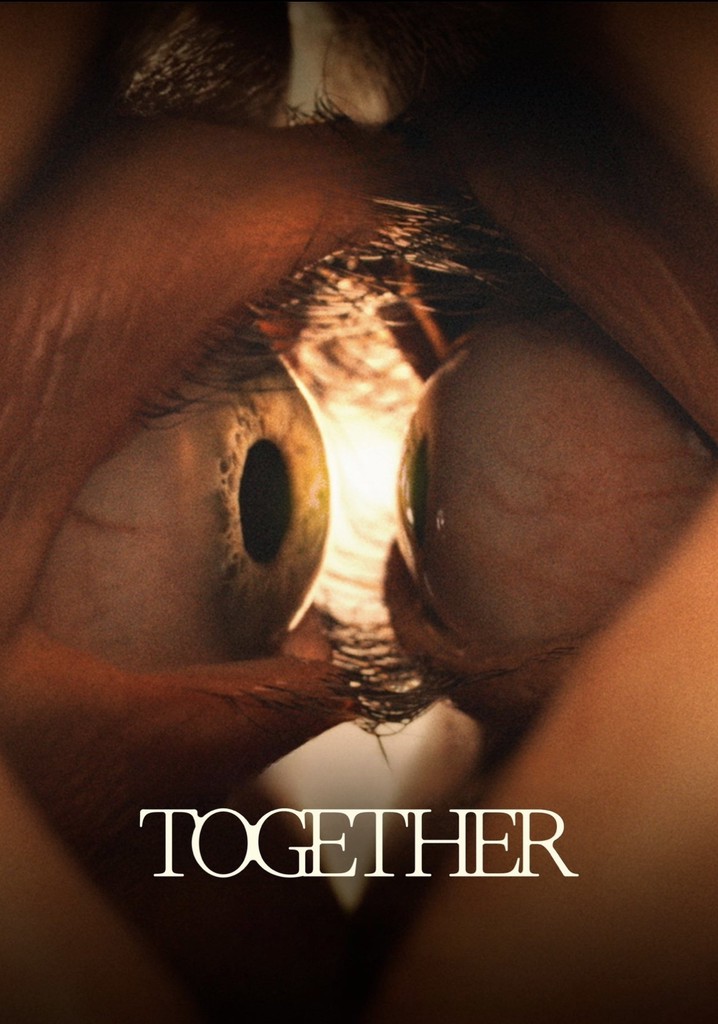
Together is a 2025 body horror movie about a couple who finds themselves increasingly stuck together. After Millie gets a job in the countryside, she and her partner relocate together, though he is dealing with the loss of his parents. Exploring the area on a hike, the couple fall into a cavern where the series of sticking together begins. As they attempt to adjust to their new environment, a plethora of instances of this occur. Things start to get truly dire and the cultish truth of the situation makes itself known.
I have been looking forward to this movie since I saw the trailer way back in… February? January? Lowkey writing this dissertation (and my master’s program overall) has absolutely destroyed my sense of time. Which is to say: I have really been anticipating it. I was a little worried because the main theme was so blatantly apparent from the trailer, which always gives me a considerable amount of pause, but in this case I think it was all right.
So the absolute best part of this movie was the body horror. It was genuinely creepy and visually really distinct from other body horror that I’ve seen. I will admit it’s not my go-to subgenre, because it can be really hit or miss for me, but this was definitely hit in terms of the scares. The composition of it worked so well, continuously bringing in different examples so it felt like an onslaught of this unsettling imagery. The visual design of the horror was so beautiful. Michael Shanks cited The Thing as one source of inspiration, and it absolutely shows. Actually, I found his discussion of his inspirations really in line with my personal visual tastes; you can read more about them here. But one of my favorite visual motifs was the visions of Tim’s parents; the way those visuals tied into the later ones worked really well. Unfortunately, that brings me to one of my criticisms of the movie: the sudden disjointedness.
We get a hint of this with the transition point in the cave, where Tim discusses finding his parents, at which point the visuals and, with only one exception I believe, dialogue’s references to it cease in favor of the meat of the movie. This isn’t inherently a bad thing, but it served to make the middle of the movie somewhat separate from the first third or so. This happened again in the final act, which felt wildly distinct to me, in a way I was disappointed by. That is, it entirely lost me in this part of the movie. There is suddenly a cult and these scares that had been so freaky and weird were lost on me. Don’t get me wrong, they were still beautiful, especially the design of the missing couple, which absolutely evokes one of my favorite effects of all time, the Split-Face Thing. But it’s in this weird bit of editing where it almost comes across like a jump scare but you can fully see the fused couple before so it doesn’t hit and cheapens the moment.
The emotional beats were predictable, but this also meant they lost power to me; there was never that gut punch even as the performances knocked it out of the park. I don’t mind a triumphant acceptance of the body horror at the end—actually I think that’s pretty cool—but it didn’t work for me, and I can’t identify the reason why. I thought at first it could’ve been the framing as so jubilant and exciting in what to me presents a horrifying possibility, but upon thinking about it, it really isn’t that. Instead, I think the couple at the start of the movie fit the one at the end, but that whole middle part characterized them in a different way, that felt really disconnected and stopped that ending moment from hitting.
All that said, I did enjoy the movie. I can’t wait to see what else Michael Shanks has in store, because reading a bit about him, he has these really weird, inventive ideas I would love to see on the screen.
The Banshees of Inisherin (2022, dir. Martin McDonagh)
The Banshees of Inisherin is a 2022 comedy drama that follows Pádraic, whose best friend has recently decided to stop being friends with him. As he continues to reject the situation, Colm grows increasingly severe in his response until the situation between the men escalates into something they cannot return from.
So this was actually a recommendation and admittedly one I put off for some personal reasons because I heard it was so sad. The good news is that sad was exactly what I wanted for a lot of this month, although writing this review after watching some of those, it doesn’t do its tragedy in the same way as the other films. Here, it’s a lot more understated, though perhaps because the emotion of it is supplementary to its themes.
Don’t get me wrong—these were really solid performances that were devastating in how subdued they were a lot of the time. That is, some really intense moments happen and they feel distant with how the characters react to them, but in a way I really liked. I’ve really struggled for a few days figuring out how to describe it, but it sort of goes, “This is just how it is,” over and over. Characters react, of course, but the narrative is often unforgiving in this really captivating way. And that’s all in service of this theme of conflict and grudges. It’s really slowly introduced, such that the movie starts out feeling like a strange and offputting anecdote, and it morphs into a broad statement of purpose with really no resolution. It’s almost absurd until it’s not—until it’s really deliberate and clear in what it’s saying. I think one could argue it’s form is much that of a tragedy, but I think that undercuts the very apparent broadening you feel throughout the film. I found this movie had a genuinely novel (at least to me) way of structuring its ideas that I really haven’t seen in anything else.
Superman (2025, dir. James Gunn)
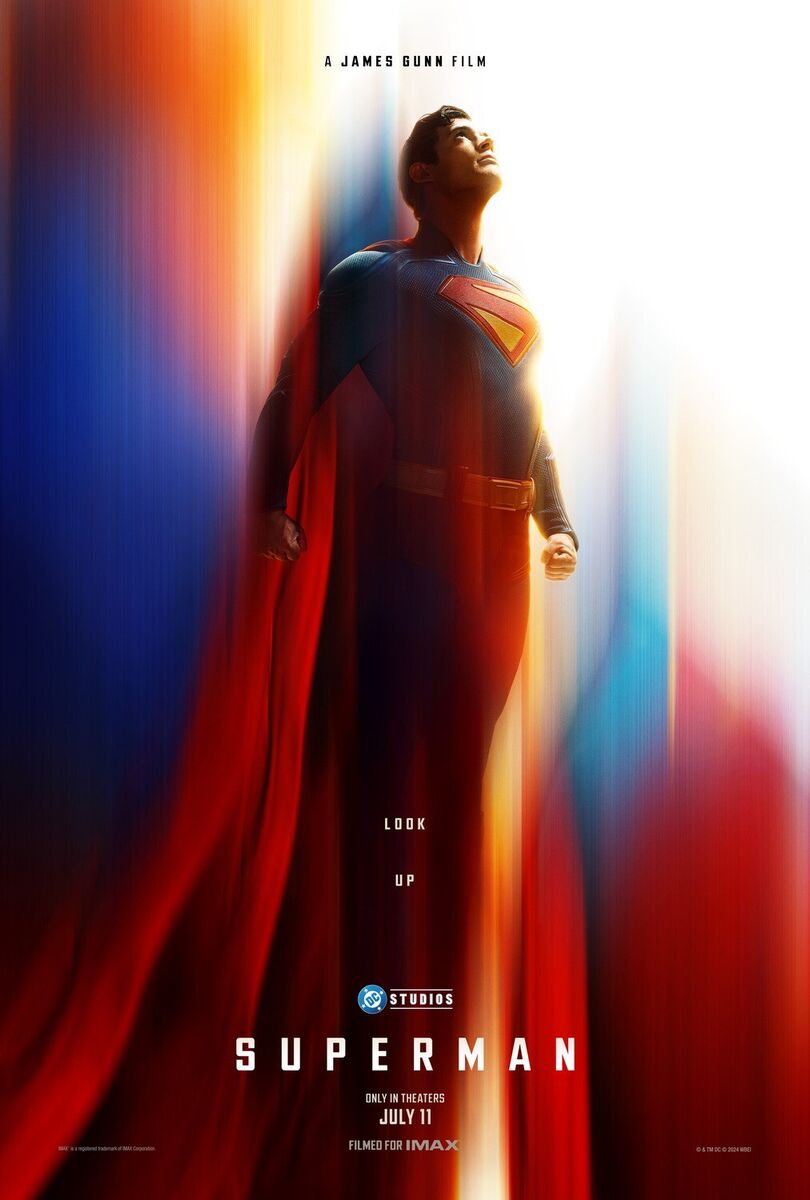
Superman is a 2025 movie following the classic character of the same name; it begins with Superman involving himself in an international conflict, for which he gets much flack. This is masterminded by Lex Luthor and through a series of occurrences, Superman becomes wanted due to a message his parents sent with him as a baby. There’s a prison escape and some interactions with a small handful of other superheroes, and eventually they delegate tasks such that the day is saved in both the international conflict and planetary threat.
I heard absolutely stellar reviews for this movie and while that’s not always enough to get me, a superhero hater, on board, Clark Kent is. I don’t want to harp too much on the things I didn’t like about this movie, because at the end of the day, its biggest sin is that it’s a superhero movie in 2025, which is to be expected. In this instance, Clark being there was not enough to get me to like this movie; this is not super uncommon. As much as I like him as a character, I find things with him in it can tend to be formulaic and structured in a way that just doesn’t interest me. The cast of characters don’t offer anything new, and it’s not that I dislike them, but I don’t find they add anything interesting to the story. There may be slight differences in their characterization from other versions of them, but I fear it’s much the same as when I ask a friend to choose between two fonts—they’re different to me because I love fonts. Not because they can’t tell the difference, but because it’s only relevant to me. I found myself wondering what this movie was doing differently. My question wasn’t so much thematic, but just on a narrative and character basis; in that sense, I was bored by the execution.
Even if I could’ve gotten beyond that, I said “superhero movie in 2025” for a reason. I’m not a fan of the subgenre, but I won’t pretend there aren’t exceptions. In fact, there are quite a few and, like I mentioned, I like Clark Kent. But this movie is so superhero: the epic music, the specific brand of fight scene, the cast of other heroes… I’ll run with that last one, because it highlights my issue. On the outside of this world looking in, the whole “Justice Gang” was insignificant to me. I could not tell you what they’re doing there or what purpose they serve rhetorically. It’s not that the structure isn’t present or that these characters are meaningless in terms of the story (or at least not all of them), but that the story and all its components are so entrenched in this canon. Of course I understand what is immediately happening on screen, and frankly I know the Superman story pretty well, but the cameos, the asides, the specific brand of conflict. I was actually really excited for that and while the film delivered, it was just lackluster. The theme of immigration barely impacted the plot—nothing made it idiosyncratically meaningful, it could literally be exchanged with another superhero also facing backlash. It’s not that it was bad or misplaced at all, but that I felt it could’ve been explored more.
The thing is, my main criticisms aren’t even particular to this movie. Every once in a while someone will beg me to watch this or that superhero movie, promising I’ll like it, but there’s such a high barrier to entry with the sheer number of references, cameos, fan-service jokes… The list goes on. This is a movie for people who have watched all of the other movies, or because I’m not certain all of these characters are from other movies, read the comics. Admittedly this movie was lesser than others I’ve seen in this sense, but it still fell victim to it. I enjoyed my time enough, especially because I already think a number of actors are funny and ones who are new to me compelled me in other ways, but I think the hype only applies if you are really into this genre of film. Also I think there is absolutely something to be said with the women in this film. Like, it was genuinely jarring. I’ll go back to my summerlong Smallville watch, i.e. the best place to see Clark Kent.
All of Us Strangers (2023, dir. Andrew Haigh)
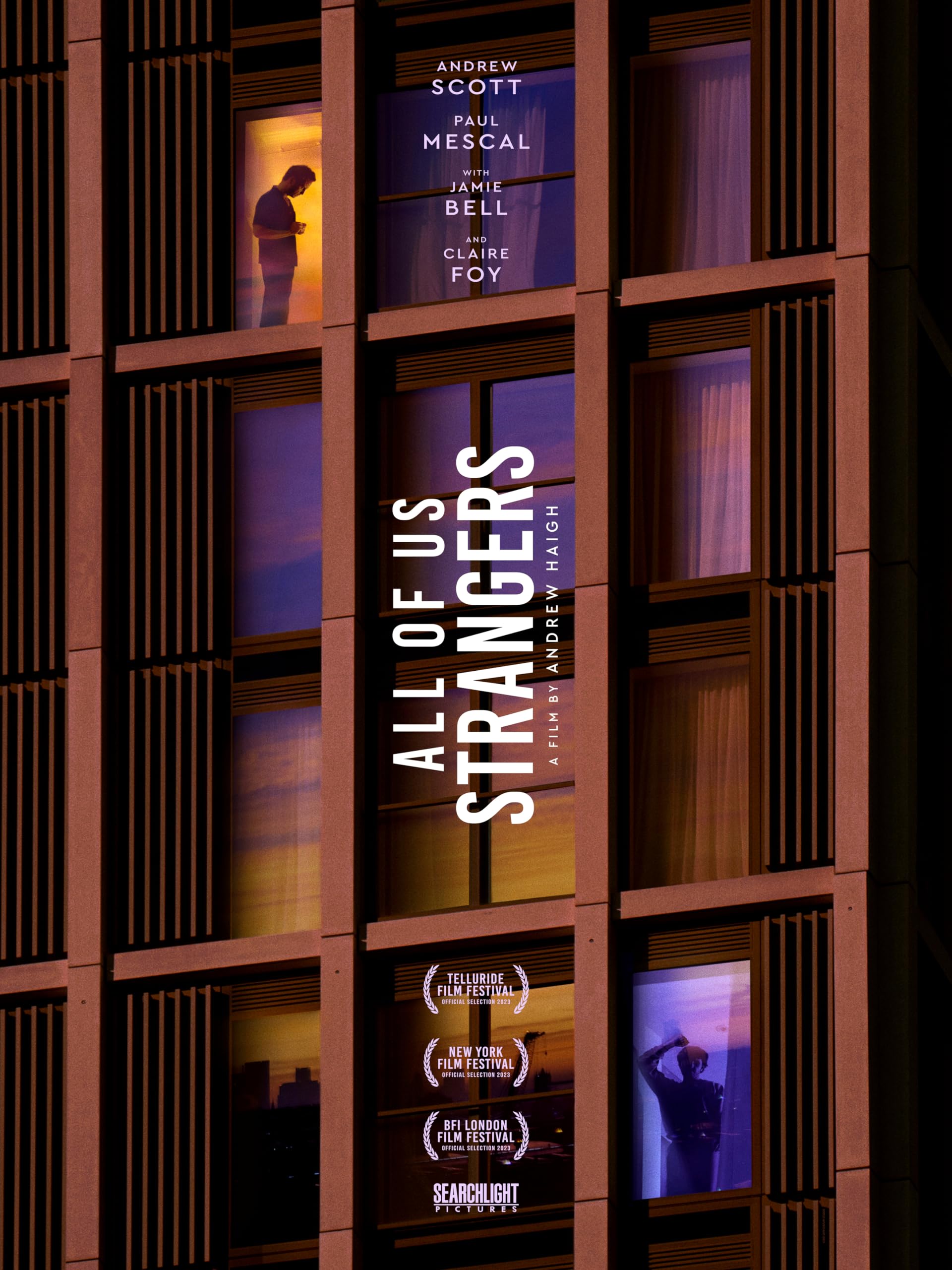
All of Us Strangers is a 2023 fantasy ghost story that follows Adam, who reconnects with his parents who died decades earlier as he falls in love with his neighbor, Harry.
I will admit that this is my first full watchthrough on a technicality; I actually meant to review it for my August reviews way last year, but less than halfway through and I was already so devastated that I could not continue. I finally got around to finishing it this month and when I say I had to sit there in silence staring at a wall after, I fully mean it. This movie got to me that no other movie has gotten to me this year; I’ve been moved by quite a few, but it speaks so poignantly to the topics it wants to discuss.
Every aspect of this movie is stunning—the visuals are beautiful and artful, speaking to the fantasy tone while keeping it grounded in the time it’s set in. Alongside the narrative, they create this world that feels so isolated in the best way; it’s neither a sense of inside looking out, nor of overlooking a production detail, but this intense and overwhelming loneliness that permeates the film. The writing contributes to this, naturally, and is similarly incredible in its precision and emotionality. It balances the fantastic with the grounded to create this sense of ambiguity that’s totally deemphasized. That is, there is a part at the back of my mind wondering how much of this is real, imagined, written, but it is so secondary to what I’m watching as it is utterly captivating. This is on account of the performances, which are just amazing and they really stole the show.
I’m shuffling my feet a little that I don’t have much more to say about it, but honestly it speaks for itself. The artistry in this movie is genuinely breathtaking, and its representation of these emotions is so intense and profound. Simultaneously I felt my own experiences reflected in this movie and could be fully immersed by these characters. This is a perfect use of a ghost story, and bringing in the fantastical tone works unbelievably well.
Fallout (2024, created by Graham Wagner and Geneva Robertson-Dworet)
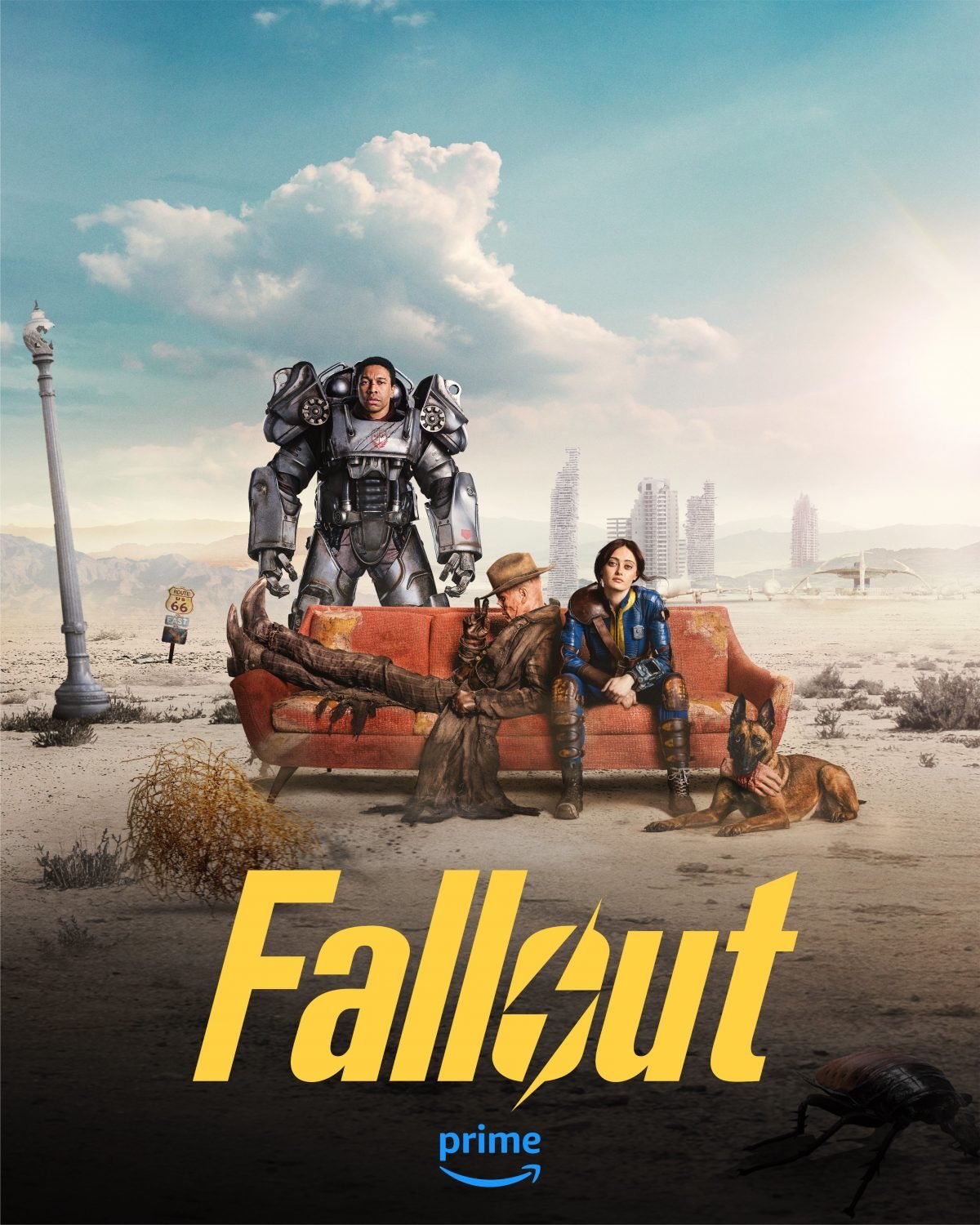
Fallout is a 2024 television series based on the video game franchise of the same time; it takes place in and inspiration from the world of the game, though its story is unique for the show. Following a nuclear war in a retro futurist society, the planet has been turned into a post-apocalyptic wasteland. Cowboys and knights inhabit what’s left of the world, but that’s not to forget the small civilizations that have been living underground for centuries. Following each of these types—a family-oriented bunker inhabitant, a runaway yet ambitious knight, and a bounty hunter cowboy with a mysterious past—we go on a series of adventures involving a severed head that changes hands quite a few times as each separate faction vies for it for one reason or another.
I haven’t played any of these games myself, so I will not be reviewing it as an adaptation or spin-off, but instead a fully formed work of its own. With that said, it’s not a game franchise I’ve never been tempted by; while I don’t know the plots of any of the games, I am familiar with a good portion of the general vibe and aesthetic. As a casual observer, I think the largely original story option was a solid choice (compared to an adaptation of a particular storyline that’s already explored in depth) as it introduces the new audience to the world but still gives the myriad of options that are any of the games.
So it could’ve been confirmation bias happening, but I definitely felt the game influences. It was still totally a television show and not confused about itself, but the nods were there. Most apparently this occurred in the structure of each episode with regards to the season overall. It was very typically episodic, but it had these shifting motivations such that characters paired up in different ways and had different goals in each episode. It made the immediate tasks or situation more relevant than the larger goal, but that was still kept in mind. I noticed it more in subtle aspects of the storytelling, with the focus on continuity in visuals (for example ensuring we saw when and where certain characters picked up weapons), emphasis on the worldbuilding (as a noun, not so much a verb at times), and choreography of the fight scenes (I don’t know how to characterize them, but at one point Kyle MacLachlan’s character drowns someone which really came out of nowhere). I didn’t actually have a problem with these, except the worldbuilding one, which at times could’ve used a bit more. Notably the medical situation—I’m not convinced if this is a hook for the next season or exclusively a reference to the game. I also had questions about the currency; when you introduce specific numbers on television, I’m going to have questions, but they weren’t answered. It’s such a small thing, especially because the medical situation is at least very clearly part of the lore, but more one that characterized the feel of the show more than outright annoyed me.
However, something that characterized the show and did more than annoy me was the competing visual and tonal moments. I could accept the retro futurist look and western look going together (also, when I say “look” I also mean the themes and tones tied to it), but I really struggled with the knights. The entirely different speech style really threw me every single time, even late in the season, and I didn’t exactly get where or how they fit in the world. Not out of lack of understanding, but more that I found them very boring compared to everything else (and I occasionally dabble in knights, so it’s not that). But more than that, I felt the editing style was also competing. Someone clearly had a vision but it felt like so much and didn’t work with any of those tones I mentioned. You can see this in something as distant as the title card, which changed each episode based on the subject matter of the opening. I actually usually really like this, but for some reason it did not hit. I think because it drew on other visual language rather than that being used in the show. It was similar in terms of content, but still markedly different.
Finally, there are a few scenes I want to discuss. Coop is a character in the flashbacks who predates the nuclear attacks and his wife Frances is working for the company that created the vaults (I used the term “bunker” earlier, which they are; this is the in-universe name for them) we learn about. He is offered the opportunity to spy on his wife, who is doing questionable things at this company, but decides not to. After sitting on a chair and thinking about it, he changes his mind. This progression, though it was quick, seemed entirely insignificant. I could understand it if he had something happen to prompt it, but all that seemed to be was him watching his old movies late at night by himself in the dark. He literally comes to this decision through introspection, which… Frankly, I don’t even know how to interpret in television. But we saw something similar earlier with Maximus. Essentially, he is accused of hurting another knight to get their position and soon after facilitates his knight’s death as a squire. Both of these moments are pretty toned down and ambiguous, such that he “may or may not” have caused these characters’ pain or death. But I use quotes because it is framed as a simple matter of, “He’s just being accused! *wink.*” Except for he was just being accused and he did just let this person die, but more passively than implied. And that’s fine, but we don’t learn that until the end of the season. I bring it up because I think if I went back I would notice more instances of this shifting. It’s not exactly inconsistency, but it’s a strangeness I struggle to characterize. In conversation with the shifting motivations I discussed earlier, I think it’s worth more discussion, but I don’t exactly know what to say about it.
For all my gripes, this is the show I’m telling everyone about right now. It really captured my attention. This was not because I think it’s good, for the reasons I enumerated, but because it’s compelling regardless. I really ended up liking the world and quite a few of the characters. I was so invested in their storylines and seeing how they would navigate this big world. I am already planning to watch the second season.
All My Friends Hate Me (2021, dir. Andrew Gaynord)
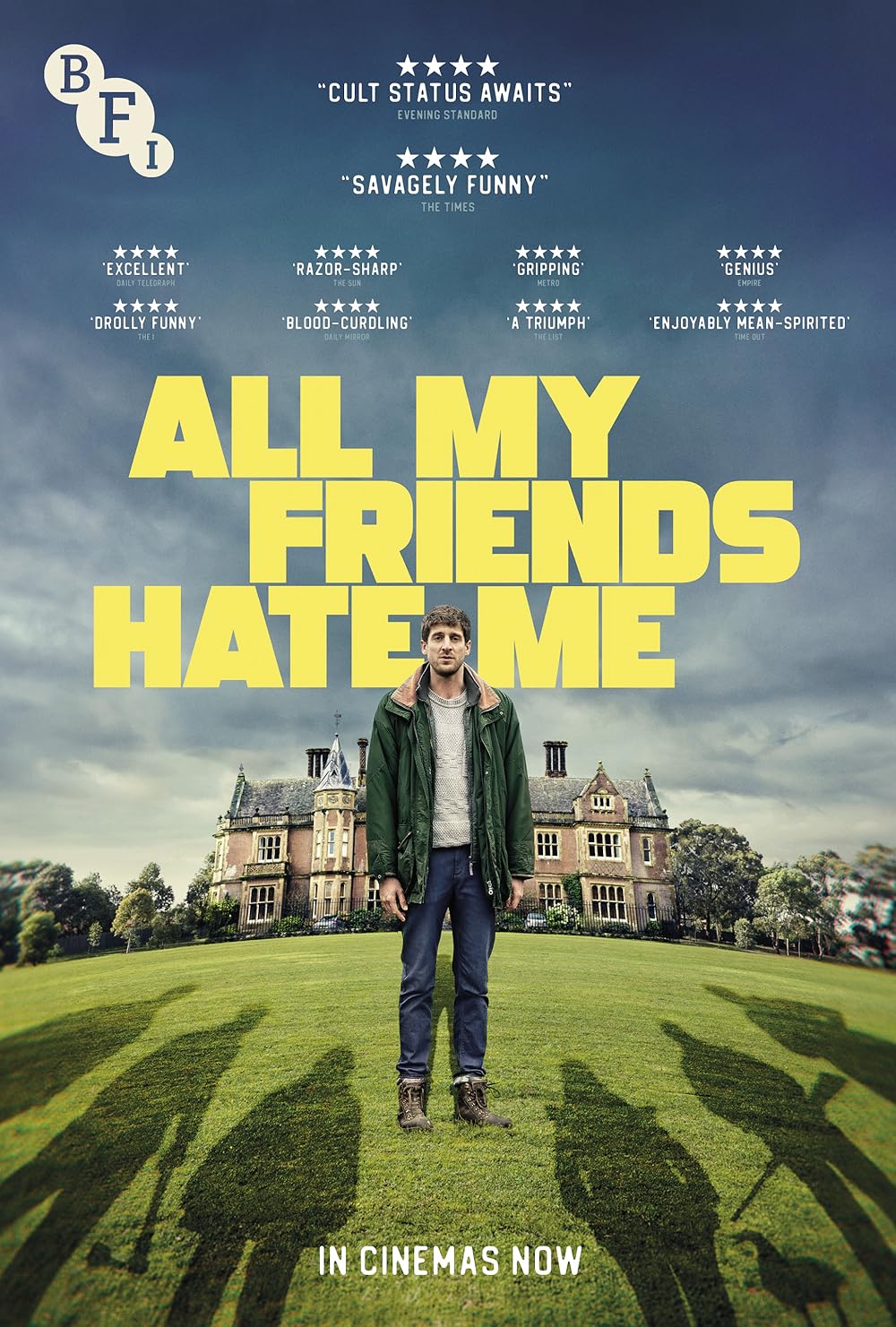
All My Friends Hate Me is a 2021 comedy psychological thriller following Pete, who visits friends from university for his thirty-first birthday and has quite the time. They bring a man they met in a pub, who is just one leg of Pete’s descent into moderate paranoia.
So this movie, as I learned, is not a witty murder mystery, which is the subject of the forum I found the name on. I actually ended up liking it well enough, but I was waiting for this particular shoe to drop for a good half of the movie before I realized it wasn’t coming. Instead, I got this acute sense of unease throughout—particularly this vaguely-cringey social anxiety as there is just a barrage of slightly uncomfortable scenes, though they occasionally get more intense, especially toward the end of the movie.
I thought the movie did something interesting with perspective. We stay with Pete’s point of view for most of it, and for the first little bit you can just brush off his weird comments and focus on the strangeness of the situation. But as he continues making them, you start to find them more egregious and off-putting. It just adds a nice, subtle complexity to how these characters are acting and fleshes out their dynamics as you can see how it got to where it’s at while remaining in the house or nearby the whole time. It works to get into the cyclical nature of Pete’s feelings and dynamics, which was cool. The movie was just fine, but it’s not something I would’ve tried had I actually known what it’s about, so it was nice to try something new.
Finally, and this is such a small thing, but I appreciated that these characters definitely sucked but were humanized, showing emotion even as they could be terrible. I felt it was a lot more effective at characterizing them as often callous and rude than outright stock stereotypes, which is an issue I feel like I've been running into a lot lately. I hate to compare it to other films so blatantly, but it genuinely stood out.
A Real Pain (2024, dir. Jesse Eisenberg)
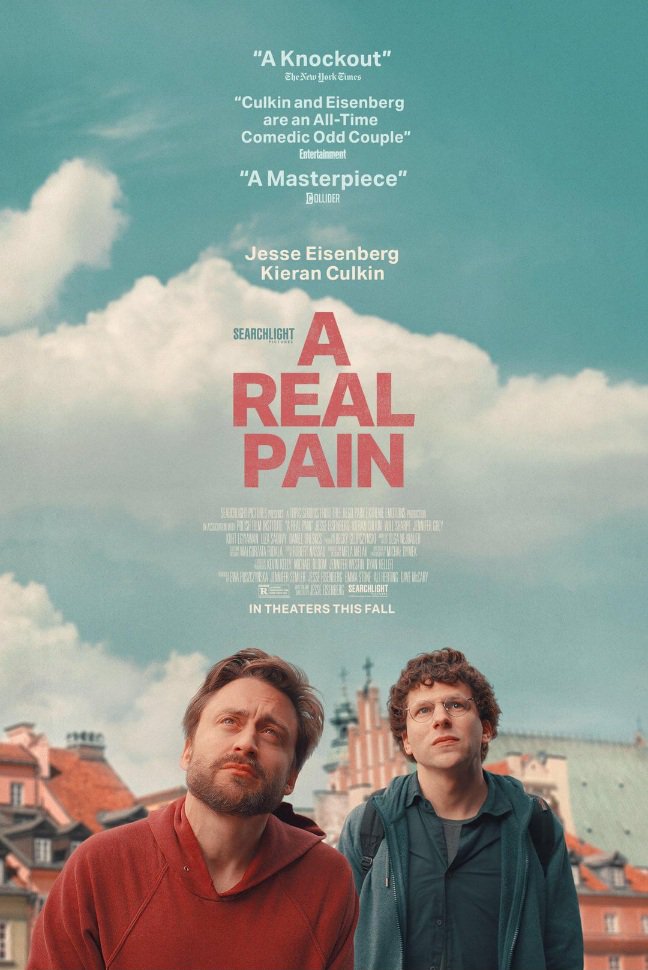
A Real Pain is a 2024 comedy drama movie about two cousins visiting Poland on a Jewish heritage tour shortly after the death of their grandmother.
I did not know until the credits that Jesse Eisenberg wrote and directed this movie (he also stars, although that’s much easier to figure out), but he did such a lovely job. I watched this movie on a whim in the middle of this month of sad and part-comedy movies, and it really hit the spot. This is a beautiful family drama that really takes its time exploring larger and smaller concepts along that line. This creates a really fleshed-out sense of these characters that is complemented by incredible performances, especially by Kieran Culkin’s (wow!).
One thing I loved about this movie is how it takes these two very broad types—the pragmatic David and free-spirited Benji—and really grounds and explores them so they feel real and impactful. It’s just a nice reminder of how the building blocks of stories can be used to create genuinely beautiful films. I found that a lot this month, this reaching emotional depth through otherwise pretty simple and straightforward storytelling. In this case, that meant a strong narrative but so much space for the actors to do their thing with the characters.
Also, I want to shout out the cinematography and editing. I don't know how else to explain it but it felt really classic and straightforward, but no less effective because of it. It goes in line with the above point, but it was still so nice to see. There is something about balancing these different elements of production, and even if one is more sidelined or not as focal, still doing that with precison and care really makes the difference. How well everything worked cohesively and the general balance was a main point of praise I had for this movie.
Presence (2024, dir. Steven Soderbergh)
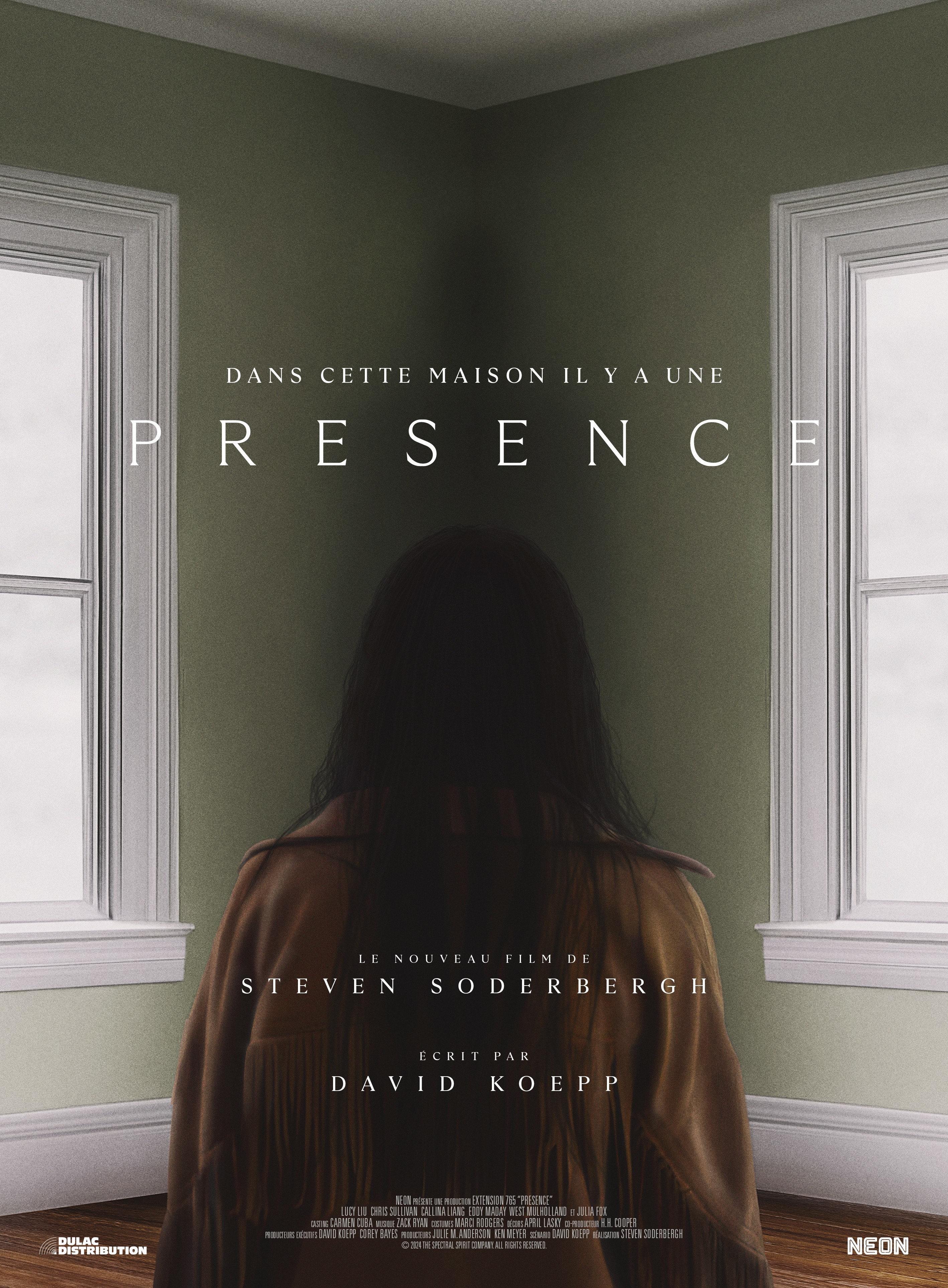
Presence is a 2024 drama horror movie about a family who moves into a home with a mysterious presence inside of it. As their daughter grieves two friends, the presence makes itself known to her, and eventually the rest of the family.
I feel like this summer is for me to get into classic ghost stories. I’ve always veered away from haunted house movies (I prefer haunted house books and slasher movies, and can rarely do the opposite) because they lose me with dramatic climaxes and underwhelming ghost manifestations. But this movie does the perfect thing: focus on the drama with the ghost as a supplementary but important aspect. The drama here is great; it actually did not get me until about a third or so through the movie. I found it a bit droll at first, but it’s a very short film so I decided to just finish it. I’m so glad I did. As things got worse for the family, the drama was revealed and their dysfunction became even more apparent. I loved the way time passed in this movie, with choices made off-screen and discussed later. It felt episodic yet cohesive and worked nicely in terms of structure.
Of course, I can’t forget to mention the strange cinematography. This movie has a series of long shots that follow the characters around the house, cutting to black between scenes; essentially, it is from the point of view of the presence. I was a bit wary of this, as a movie I started had a similar style that I struggled with (although I plan to eventually return to it). But it was done very nicely, and while it had that “presence” in some of the specific maneuvers, generally it just felt like a standard long shot. It created this claustrophobic sense as we did not leave the home, but kept it visually interesting, which was perfect for this type of contained story. It’s my first Soderbergh film (I know!), but from what I was reading this movie seems distinct from his others in terms of style. I’ll definitely give them a watch at some point.
Overall, this is a pretty straightforward movie done well. It takes its visual concept and executes it beautifully, then complements it with a grounded, compelling family drama. I couldn’t ask for anything more—watching this movie felt like reading a ghost story. Strangely, it gave me the most uncanny sense of déjà vu.
The Thursday Murder Club (2025, dir. Chris Columbus)
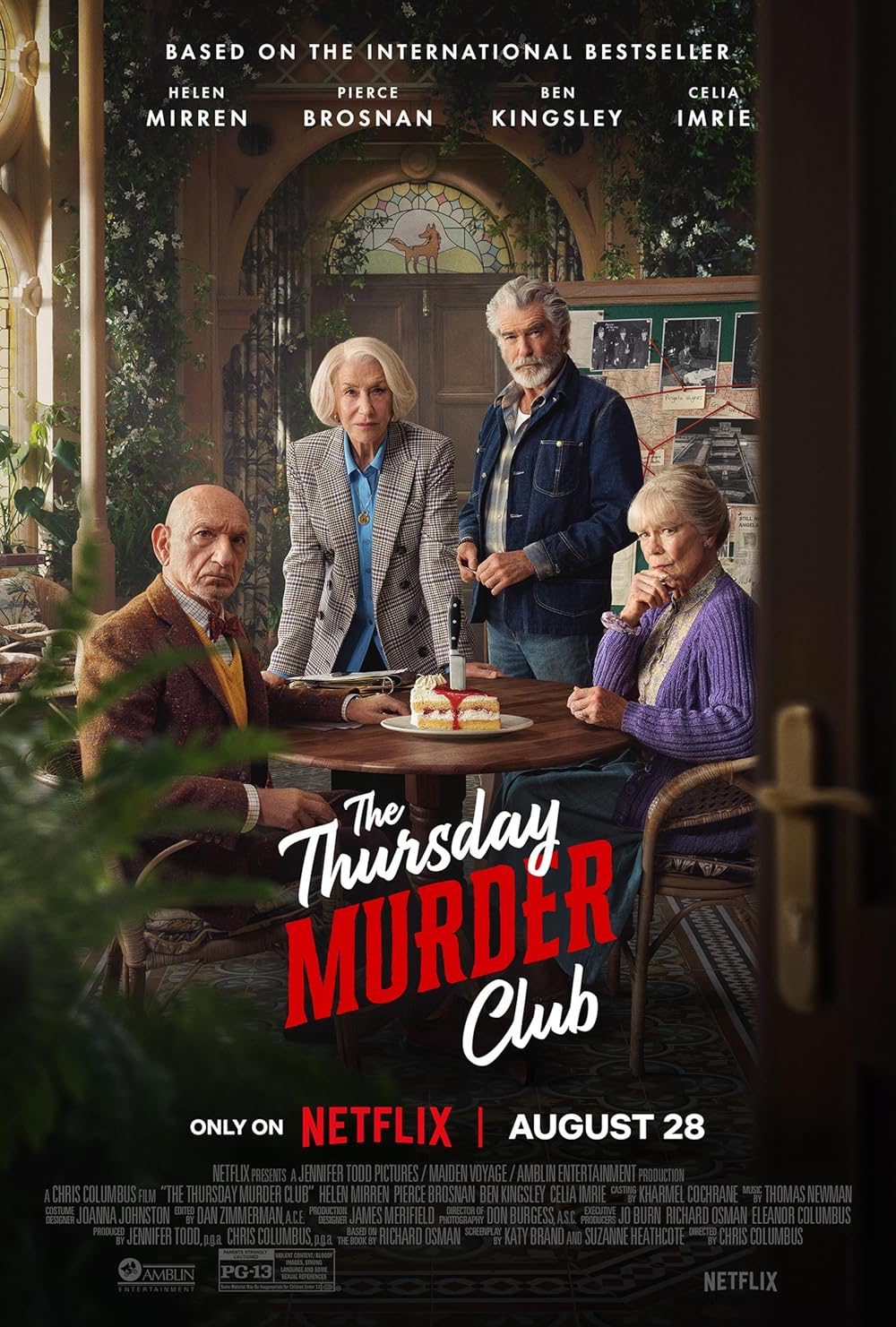
The Thursday Murder Club is a crime comedy released earlier this month based on a book of the same name, which is a cozy mystery. The film follows a group of four elderly crime fans who attempt to solve cold cases once a week; things change when a murder happens right on their doorstep. And not only that, but it is part of a plot to sell the land they live on. Together, they must solve the crime and save their home.
There are few instances in which I would rather watch a movie at home than the theater, but I am so glad that’s what I decided to do. I made furious notes during this movie. I’ve been waiting for it since I read the book a few months ago, and while I didn’t end up enjoying the sequels, I did like the first one in the series. I was surprised at the direction it took from the trailers, but that in no way prepared me for what direction this movie actually took. What did prepare me was a quick glimpse at the Wikipedia listing where, in case you missed it in the little heading, it says that Chris Columbus directed it. I’ve since taken a brief glance at the history of production and all I can say is that I am shocked and appalled at the direction they went. I don’t want to just explain how I would’ve done it, but this movie is not at all cozy. In fact, I really struggled to pin down the tone.
The best word for it is probably “fantastical” but I don’t mean that in the same way I usually do. In those instances, I mean a light world hiding emotional darkness, bright colors, theatrical performances, literary dialogue, magical influences—the list goes on. Here, I mean that you can definitely see the style Columbus is known for and it’s quite jarring against the plot backdrop. Not in an intentionally juxtaposed way between the tone and murder (or if that’s the intent, it’s not effective), but it feels ungrounded and, frankly, accidental. There is nothing happening that demands these panning shots, large and vast series of apartments, and mysterious, twinkling music. It’s never homey, just grand; this is a diversion from the book, but specifically one I think was a poor decision. For one, the homey (cozy) feeling but murder mystery makes for a fun contradiction, but for another, it complements the housing storyline.
But, all right, I pause the movie, readjust my expectations, and take it for what it is. After a while, I can put the style to the wayside and just enjoy the movie for what it is (save for the panning shots, which I could not get over). And then I had to wonder what exactly it is trying to do… I’ll get to the mystery, but let me first explain what we’re working with in terms of the writing and the world. The first act is very quick but very strange. I don’t know how else to describe it besides that it is introduction after introduction. There’s one chance meeting, and everything else is characters going, “Hi, my name is Blank. It’s so nice to meet you.” This goes on as they try to add coy transitions between scenes. So you’ll have a scene that essentially ends, “Who’s Penny?” And then we immediately meet Penny. Same scene, someone says, “How is Stephen doing?” And then we immediately meet Stephen. Furthermore, the scenes were completely illogical. In one, Donna arrives to give a talk, she starts but gets some heckling from the crowd, then gets distracted by her car being booted. The main gang wander up to her, still conceivably in the middle of her talk even as poorly as it’s going, and invite her to lunch. Seconds later, we’re at lunch. So did they sit back down while she finished her talk or did everyone just walk off after sitting down to see it? It’s a small gripe and one I’d usually be willing to overlook, but with all these other instances of strangeness together, it feels elementary. And I don’t mean that generally, I mean when you go back years later to a story you wrote as a young child and it’s all everyone meeting, telling each other their names, and wandering around aimlessly in scenes that follow no logical progression. Similarly, there is this necklace with a logo for the titular club that’s supposed to be this huge emblematic passing the torch moment. It felt so fantastical and entirely divorced from anything this movie was. Also, I could’ve missed it earlier, but I think it was literally introduced in the last five minutes of the movie.
It’s probably needless to say, but we didn’t really get to know the characters. It circled through perspectives, which admittedly the book does as well and was notably my biggest issue with it, but it makes sense there. Here, we follow Elizabeth for most of the time, but there’s this arc for Joyce about her daughter starting out as nagging but loving and eventually accepting her mother’s choice to live here, that was entirely unearned. I started the movie surprised at quite a few of the casting choices and ended it unsure if that was founded or not, because I didn’t actually see anything to prove me right or wrong.
You’d think this would all be because they were busy solving the mystery, but it wasn’t really that either. There were so many characters and subplots and the movie tried to fit way too much in without exploring any of it. I could not tell you why the runtime was so long (two hours!). They simplified the mystery—this was actually my biggest issue with the movie, although I liked it in the book and think people should go read that instead, and hence will not spoil it. Essentially, there are two simultaneous mysteries but the film focused on one, and in so doing completely destroyed everything that made it interesting, mainly because this isn’t actually the mystery the gang solves of the two. Honestly, at times I think the beats only made sense because I knew where the story was going already.
I found this both an unsuccessful adaptation and unfortunately one of my least favorite murder mysteries I’ve seen. I don’t normally categorize films so blatantly, but I was appalled at some of the choices being made. I have to say, I was really surprised when I learned (after seeing it listed in the local theater showtimes list) that this is a movie and not a miniseries. That definitely would’ve allowed for the more complex storylines the book has. But even if the filmmakers wanted to simplify it, this was not the way to go about it, as it cluttered and unexplored.

